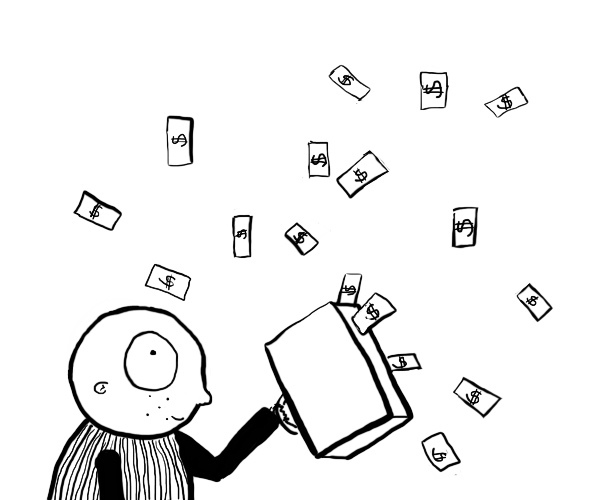Writers become writers because they have a dream–they want their stories to be read. But before I was trying to get published as an author, I thought all of these people had it made. These writers looked fabulous, thanks to professionals who took very nice author images of them on websites. They sounded intelligent and some of them were funny, especially at the panels that I went to. They looked oh-so-successful.
But not all good writers are their best publicists — public appearances contain an element of performance and there is so much stress behind getting ready for a panel or a book signing. Those who aren’t savvy may trip up or make gaffes.
More importantly, there are so many struggles that writers face, and to use the metaphor of a swan swimming elegantly on a lake, one does not often get to see the difficulties of paddling across the lake, which is pretty much analogous to being an author.
- Money; the making of it
Authors don’t make much money. At least, not the ones in Asia. A lot of people have asked about the money that comes from the book after you get a book deal. First, the publisher gives me an advance. Writers generally get 5% for every book sold. So if a book costs $10, you get .50 cents. If you get a $100 advance, it means that the publisher thinks you will sell 200 books, even though none are sold yet. This is pretty much goodwill money. If you don’t sell enough copies to break past the advance, the publisher usually drops you, the writer. It is sad, but it happens. For me, one representative from my publisher emails me the breakdown in terms of sales every year and then asks me to send an invoice. Since publishing is small in Asia, the amount doesn’t tally up to much. However, I am glad that the book is selling well. Even then, it hasn’t been easy. I have struggled with trying to support myself and my work with a job on the side; what I am qualified for does not amount to much of a salary and I have to look into other skills that will make me more valuable and useful to employers.
- Privilege
Like so many other writers, I have to get a job. There is no way around it. There are other writers who can write full time because they come from a well-off family or they married a well-off spouse. Often, those with the privilege are oblivious to it. Ages ago, at a writer’s panel at –where else– the Singapore Writers Festival, one writer could not fathom what else could be done for women writers in Singapore because she was in a privileged position. So if you go to a writer’s panel and see that a writer mentions that s/he is able to write full time, or that s/he miraculously got a book deal, remember that that person usually has a comfortable financial safety net, or probably knows someone who is in the industry. Some writers have parents who are editors or went to very literary schools that provided them with the contacts that enabled them to publish. Again, you don’t know this because you may not be part of their inner circle. I wish this would change and that we could be more inclusive because we need a variety of stories from a variety of writers who come from different backgrounds. If one needs to have some amount of wealth to publish, then the type of stories produced will only come from one point of view. This also intersects with class–many a time, those who are poorer are of minority races, so that’s how and why you see so many white people or Chinese people in Singapore being published.
- Self-promotion
I don’t like it, but all writers have to do it. Sometimes, our publishers help us a bit, but being an author in Asia is tough because you have to go look for events to present your work at and rack your brains to think of workshops to present to people at events. I’m finding out that it’s exhausting, even though it can be a lot of fun. When I won the Hedwig Anuar Children’s Book Award, I had to get the word out and do an interview with the national newspaper as well. No one knew who I was. Of course, the whole point of being a writer is not to be famous; it’s to be read. But more often than not, our faces or know us through interview and evens so that they may possibly buy our book. Sales are not guaranteed.
- Writing groups/workshops/courses
Writing workshops and courses in Singapore can cost a lot. They really do. Again, it’s for the privileged who have money to spare to learn how to write. Of course, you should try and learn to write on your own — there are online courses and books at the library also serve this purpose. However, one must read fiction if you are writing fiction. As for writing groups? There are more misses than hits as many people only want to know how to publish a book and not hone their craft. Writers here are also incredibly individualistic people so the community doesn’t exist beyond the bounds of the classroom. In short, everyone has their own agenda and there isn’t a push for people to support one another, unless they came from the same schools or cliques. Yet, I have encountered incredibly talented people along the way, and I do my best to support them. I hope that they succeed as writers.
So this is what it’s like being a writer in Singapore. I may update this post from time to time with other miscellaneous information if things change, but I am cynical so I think it’s highly unlikely.
